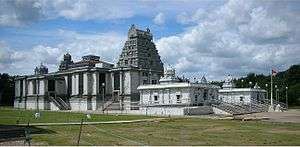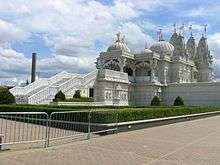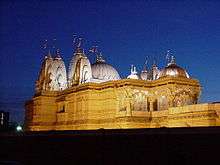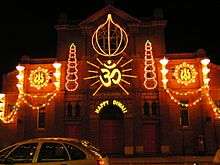Hinduism in the United Kingdom
For a specific subregion breakdowns of Hinduism in the United Kingdom, see: Hinduism in England, Hinduism in Scotland, Hinduism in Wales and Hinduism in Northern Ireland
| Year | Pop. | ±% |
|---|---|---|
| 1961 | 30,000 | — |
| 1971 | 138,000 | +360.0% |
| 1981 | 278,000 | +101.4% |
| 1991 | 397,000 | +42.8% |
| 2001 | 558,810 | +40.8% |
| 2011 | 835,394 | +49.5% |
| 2017 | 1,021,000 | +22.2% |
| Religious Affiliation was not recorded prior to 2001. | ||
Hinduism has had a presence in the United Kingdom since the early 19th century, as at the time India was part of the British Empire. According to 2011 Census of England and Wales, 817,000 residents (1.5%) identified themselves as Hindus.[1] Hindus were the fourth largest religious group in the 2011 Census of the United Kingdom, after Christianity (59%), No Religion (25%), and Islam (5%).[1] Among those of South Asian origins, Hindus in the United Kingdom (27%) constituted the second largest group after South Asian Muslims (57%), and exceeded South Asian Sikhs (14%) in the 2011 census of the United Kingdom.[2]
| Year | Percent | Increase |
|---|---|---|
| 1971 | 0.25% | |
| 1981 | 0.49% | +0.24% |
| 1991 | 0.69% | +0.20% |
| 2001 | 0.95% | +0.26% |
| 2011 | 1.32% | +0.37% |
| 2017 | 1.60% | +0.23% |
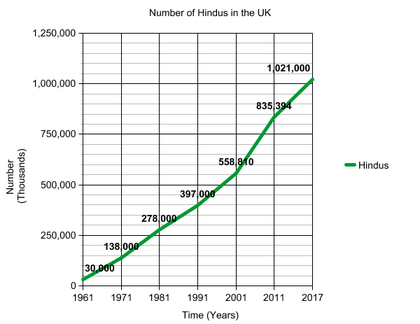
History
The British Hindu population includes those who came directly from the Indian sub-continent, descendants of those Hindus who had originally migrated to other countries but later resettled in the United Kingdom, and those born and raised in the UK. It is not unusual to find third or fourth generation Hindus in the UK.
There have been three main waves of migration of Hindus in the UK, and most of the Hindu migration has occurred after World War II.[3] The first wave was at the time of British India's independence and partition in 1947. Also, in the early 1960s the Conservative Health Minister the Rt Hon Enoch Powell recruited a large number of doctors from the Indian sub-continent.[4] The second wave occurred in the 1970s mainly from East Africa especially due to the expulsion of Asians from Uganda.[3][5] Later, communities included those from Guyana, Trinidad and Tobago, Mauritius and Fiji. The last wave of migration began in the 1990s and is a result of the United Kingdom's immigration policy, which made studying and immigration to the UK easier. This wave also included Tamil refugees from Sri Lanka and professionals including doctors and software engineers from India.[3]
Demographics
Hinduism is followed by 1.5% of the population of the England.Hindus constitute 0.31% in Scotland[6] and 0.34% in Wales[7]
According to the 2011 census, nearly half of the 817,000 Hindus living in the UK were residents of the London metropolitan area.[8] About 300,000 British Hindus of all ages were born in the UK.[3]
The Hindu population in the UK is predominantly urban, and has relatively higher representation in the professional and managerial positions.[9]
Community and Social life
According to United Kingdom's Office of National Statistics, of all ethnic minorities in Britain, the British Hindus had the highest rate of economic activity in 2011,[10] and a median net wealth of GB£206,000 in 2006 (compared to median net wealth of GB£223,000 for British Christians).[11] Hindu men are more likely than the general population to be entrepreneurs, and both Hindu men and women are more likely than the general population to have higher education.[9] Over a 20-year period, British Hindus also had the third lowest poverty level (after British Christian and British Jews),[12] and the second lowest rates of arrest, trial or imprisonment at 0.5% (after British Jews' 0.3%) among all ethnic groups tracked by UK's Ministry of Justice.[13] Hindus constitute less than 0.5% of the total Prison population in Britain (compared to 48% for Christians and 15% for Muslims).[14]
Temples and Organisations
A University of Derby report states that there are considerable linguistic and theosophical diversities among Hindus in the United Kingdom, yet they also share certain core beliefs, rites and festivals of Hinduism.[15] The National Council of Hindu Temples and the Hindu Council of the UK are among national umbrella organisations for Hindus in the UK. There are regional organizations that organize community events and social affairs in the UK, such as The Hindu Council of Birmingham.[16]
UK-wide Hindu organisations include the National Council of Hindu Temples UK which is the oldest UK-wide Hindu organisation. It comprises over 300 Hindu Temples and Hindu Faith Organisations.[17] The Hindu Council UK representing almost 400 affiliated cultural and religious organisations of various Hindu denominations including temples,[18] and The Hindu Forum of Britain, with nearly 300 member organisations.[19]
There were over 150 Hindu Temples in the UK in 2012[20] with 30 Temples in the London area alone.[21] Slough Hindu Temple was built by the Slough Hindu Cultural Society - formally opened in 1981 - it was the first purpose-built Hindu Temple in the British Isles. However, the first Hindu Temple in the UK was opened in the late 1920s near Earls Court in London and it was functional for about four years.[22] In 2020, Historic England (HE) published A Survey of Hindu Buildings in England with the aim of providing information about buildings that Hindus use in England so that HE can work with communities to enhance and protect those buildings now and in the future. The scoping survey identified 187 Hindu temples in England.[23]
There is a diversity of Hindu-based organisations in the UK including the International Society for Krishna Consciousness (ISKCON), Swaminarayan (BAPS) in Neasden (Greater London), the Chinmaya Mission, Ramakrishna Mission and Sai Organisation, each having large followings. SHYAM, an educational Hindu organisation teaches the Bhagavad Gita, Ramayana, Shrimad Bhagavad, Vedas and Upanishads.[24] The predominant Hindu beliefs found in the UK include its Vedanta monist, Vedanta monotheistic and various sampradayas.[25] Less of 1% of the Hindus in the UK identify themselves to be belonging to Divine Life Society, Hare Krishna and other organizations.[26]
Festivals and community events
Hindus in the United Kingdom celebrate major festivals such as Diwali.[27] Homes and businesses are decorated with festive lights and Hindus gift sweets such as laddoo and barfi. Community events such as dances and parties bring Hindus and non-Hindus together. Leicester annually plays hosts to one of the biggest Diwali celebrations outside of India.[28]
The Hindu festival of Diwali has begun to find acceptance into the larger British community.[29][30] Prince Charles has attended Diwali celebrations at some of UK’s prominent Hindu temples, such as the Swaminarayan Temple in Neasden.[31][32][33] Since 2009, Diwali has been celebrated every year at 10 Downing Street, the residence of the British Prime Minister.[34][35]
Hindu Council UK
Hindu Council UK (HCUK) is an umbrella organisation for all Hindus living in the United Kingdom, formed in 1994. The Hindu Council UK represents all the Hindu faith denominations, various Hindu communities and Hindus from different parts of the world settled in the United Kingdom.[36] The Hindu Council, an umbrella group for Hindus living in the UK, lists 161 temples across the UK and 423 Hindu organisations and community groups among its members.[37]
Ethnicity
According to census records, 95.6% of the Hindus in England and Wales are ethnically Asian, with the 4.4% of the remainder being as follows: White 1.47%, Mixed 1.19%, Black 0.67% and other ethnicities 1% (including 0.13% Arab).[38]
Famous Converts to Hinduism include:
- The British celebrity, Russell Brand converted to Hinduism.
- Lead Guitarist of the Beatles, George Harrison converted to Hinduism in the mid 1960s. Upon his death in 2001, he was cremated per Hindu rituals and his ashes consecrated into river Ganges.[39]
- Philosopher John Levy also converted to Hinduism.
- Novelist Christopher Isherwood, converted to Hinduism and remained a Hindu until his death.[40]
- Hindu scholar Krishna Dharma (formerly Kenneth Anderson), converted to Hinduism in 1979.
- In September 2006, Rev. David Ananda Hart made headlines when he converted to Hinduism whilst still remaining a priest of the Church of England.[41]
Politics
In the 2017 general election, 8 Hindu MPs (5 Conservative and 3 Labour) were elected to the Parliament.[42]
Discrimination and stereotyping of Hindus in the UK
A report authored by Robert Berkeley of Runnymede Trust states that the Hindu community groups and organizations in the United Kingdom face systematic disadvantage and discrimination.[9] They face a legacy of inequality, targeting and stereotyping in daily life and by the media, which has left the Hindu community isolated, with a limited capacity to engage with other communities, or address the problems they face.[9][43]
Scholars state that the Hindu community in the United Kingdom, and Europe in general, has faced discrimination in immigration policies adopted by the local governments.[44][45] In local councils, construction or expansion permits for Hindu temples and community centers have been turned down for years, while Muslim mosques and Christian churches have been approved by the same councils and built.[46] The discrimination suffered by Hindu communities from the local council officials in Britain has been described by Paul Weller as follows,
Neighbourhood traffic and parking issues continued to be reported as a problem. For example, a leader of the Hindu community told us that his temple was not given permission or space for worshippers to park outside the temple during festivals – which occurred only a few times a year. By contrast, he drew attention to parking restrictions have been lifted every Friday for the local mosque and identified this as unfair. A Hindu woman in another field research location, described problems with securing planning permission to build an extension and car park for her local temple. She contrasted this with the experience of Muslims who, according to her, had been allowed to build a mosque on 'each and every road'.
– Paul Weller et al (2015), Religion or Belief, Discrimination and Equality: Britain in Global Contexts, University of Derby[47]
Nearly 50% of Hindu children, both boys and girls, in British schools have reported to being victims of bullying for being Hindu and their religious heritage.[48][49] However, Claire Monks et al. note that children of various races and religions report being victims of bullying in British schools as well.[50]
The Hindu community in the United Kingdom is not unique in suffering discrimination and stereotyping.[9][51] The similarly small Jewish community of the United Kingdom, and in recent years the much larger Muslim community of the United Kingdom, has also expressed similar concerns. New legislation and institutions to understand and respond to religious discrimination are being debated by British politicians.[9][51]
Private golfing, country clubs and other social clubs in Britain have routinely discriminated against and denied entry to Hindus – in addition to Sikhs, Muslims, women, Africans and other minorities after asserting "freedom of association" principle,[52] and parts of EU-wide law to limit this practice were adopted in the United Kingdom in 1998.[53][54] In some instances of Islamist terrorism, such as after the 7 July 2005 London bombings, Hindus along with Sikhs of the United Kingdom became more targeted and vulnerable for backlash than Muslims.[51][55]
In October 2018, it was reported that Conservative Party (UK) London mayoral candidate Shaun Bailey had written a pamphlet, entitled No Man’s Land, for the Centre for Policy Studies. In it, Bailey argued that accommodating Hindus "[robs] Britain of its community" and is turning the country into a "crime riddled cess pool". He also claimed that South Asians "bring their culture, their country and any problems they might have, with them" and that this was not a problem within the black community "because we’ve shared a religion and in many cases a language".[56] In the pamphlet, Bailey had confused the Hindu religion and the Hindi language: "You don’t know what to do. You bring your children to school and they learn far more about Diwali than Christmas. I speak to the people who are from Brent and they’ve been having Hindi (sic) days off."[57] The Conservative Party Deputy Chairman, James Cleverly, defended Bailey and insisted he was misunderstood, and that he was implying black boys were drifting into crime as a result of learning more about Hinduism rather than "their own Christian culture".[58] However, the anti-racism Hope Not Hate campaign group called Bailey's comments "grotesque".[59] The comments were condemned by the Hindu Council of the United Kingdom who expressed "disappointment at the misrepresentation of our faith" by Bailey.[60]
British Overseas Territories
| Territory | Percent |
|---|---|
| Anguilla | 0.42% |
| Bermuda | 0.2% |
| British Virgin Islands | 1.88 %[61] |
| Cayman Islands | 0.8% |
| Gibraltar | 2% |
| Montserrat | 0.8% |
| Turks and Caicos Islands | Unknown |
See also
- Hinduism in England
- Hinduism in Northern Ireland
- Hinduism in Scotland
- Hinduism in Wales
- Hinduism in the Republic of Ireland
- Hinduism in Gibraltar
- Hinduism
- Sanskara (rite of passage)
- Hindu temple
- Vivaha
- Hindu wedding
- Vedanga
- List of Hindu temples in the United Kingdom
- Hinduism in the West
- Hindu Council UK
- Sanskrit in the West
- Hinduism by country
- Encyclopedia of Hinduism
- Religion in the United Kingdom
- Persecution of Hindus
References
- UK Government. "Religion in England and Wales 2011". Office of National Statistics (11 December 2012). Retrieved September 7, 2014.
- "2011 Census: KS209EW Religion, local authorities in England and Wales (Excel sheet 270Kb)" (xls). Office for National Statistics. Retrieved 7 July 2014.
- Fredman, Sandra (2011). Discrimination law. Oxford England New York: Oxford University Press. p. 81. ISBN 978-0-19-958442-0.
- 'Enoch Powell was not an out-and-out racist'
- http://www.ibtimes.com/uganda-legacy-idi-amins-expulsion-asians-1972-214289
- http://www.scotlandscensus.gov.uk/documents/censusresults/release2a/rel2A_Religion_detailed_Scotland.pdf
- http://www.ons.gov.uk/ons/publications/re-reference-tables.html?edition=tcm%3A77-286262
- Minority religions mainly in London. National Statistics. Accessed 3 May 2015.
- Robert Berkeley, Connecting British Hindus - An enquiry into the identity and public policy engagement of British Hindus Runnymede Trust, Hindu Forum of Britain (2006)
- Full story: What does the Census tell us about religion in 2011? Office of National Statistics, UK Government (May 2013)
- Karen Rowlingson, Policy Commission on the Distribution of Wealth University of Birmingham (2012)
- Anthony Heath and Yaojun Li (2015), Review of the relationship between religion and poverty, Nuffield College, Oxford and University of Manchester
- Gavin Berman & Aliyah Dar (July 2013), Prison Population Statistics 1991-2012, Social and General Statistics, Ministry of Justice, ONS, UK Government
- https://researchbriefings.files.parliament.uk/documents/SN04334/SN04334.pdf
- Weller, Paul (2008). Religious diversity in the UK : contours and issues. London u.a: Continuum. ISBN 978-0-8264-9898-4.
- Weller, Paul (2011). Religions in the UK 2007-2010. Derby: Multi-Faith Centre at the University of Derby. ISBN 978-0-901437-30-3.
- National Council of Hindu Temples UK, accessed 3 August 2009
- Affiliates Archived 2013-02-12 at the Wayback Machine Hindu Council UK, accessed 4 August 2009
- About us Archived 2018-05-20 at the Wayback Machine About us, accessed 12 December 2008
- LIST OF HINDU TEMPLES IN THE UK National Council of Hindu Temples (UK), accessed 3 May 2015
- 30 Temples in the London area
- Bimal Krishnadas (edited by), Directory of Hindu Temples in the UK, 2004-2006, page 7, published by the National Council of Hindu Trmples (UK), Leicester.
- Singh, Jasjit; Tomalin, Emma (2020). "A Survey of Hindu Buildings in England. historic England Research Report 203/2020". research.historicengland.org.uk. Retrieved 2020-06-16.CS1 maint: multiple names: authors list (link)
- Paul Weller, Hindu Origins and Key Organisations in the UK Archived 2015-07-16 at the Wayback Machine University of Derby, United Kingdom
- Paul Weller, Some ‘Other’ Religious Groups in the UK: Key Information University of Derby, United Kingdom
- Leicester Diwali celebrations draw large crowds BBC News (3 November 2013)
- "Diwali – The Festival of Light". Leicester City Council.
- Roy, Amit (25 October 2011). "Dazzle at downing, colour at commons". Mumbai Miday. Retrieved 3 November 2013.
- "Transcript of the Prime Minister's Diwali reception speech". Gov.UK. Government of the United Kingdom. Retrieved 3 November 2013.
- PTI (10 November 2007). "Prince Charles, Camilla celebrate Diwali in UK". Times of India. Retrieved 3 November 2013.
- "Their Royal Highnesses The Prince of Wales and The Duchess of Cornwall Celebrate Diwali at BAPS Shri Swaminarayan Mandir, London". www.mandir.org. BAPS Swaminarayan Sanstha. Archived from the original on 14 November 2012. Retrieved 3 November 2013.
- Thompson, Jessica Cargill. "Seven wonders of London: BAPS Shri Swaminarayan Hindu Mandir". Time Out London. Time Out Group. Retrieved 3 November 2013.
- PTI (17 October 2009). "Brown celebrates Diwali at 10, Downing Street, in a 'historic' first". Times of India. Retrieved 3 November 2013.
- Roy, Amit (25 October 2011). "Dazzle at downing, colour at commons". Mumbai Miday. Retrieved 3 November 2013.
- Hindu Council UK
- https://religionmediacentre.org.uk/factsheets/hinduism-in-the-uk/
- http://www.ons.gov.uk/ons/about-ons/business-transparency/freedom-of-information/what-can-i-request/previous-foi-requests/population/ethnicity-and-religion-by-age/dc2201ew---ethnic-group-and-religion.xls
- Tillery, Gary (2011). Working class mystic : a spiritual biography of George Harrison. Quest Books/Theosophical Pub. House. pp. 91–148. ISBN 978-0-8356-0900-5.
- http://www.isherwoodfoundation.org/biography.html
- http://www.thehindu.com/todays-paper/tp-national/british-priest-in-kerala-in-conversion-debate/article3074555.ece
- http://muslimnews.co.uk/newspaper/home-news/record-number-muslim-mps-elected/
- Dias (Editor: Charles Westin), Nuno (2010). Identity processes and dynamics in multi-ethnic Europe. Amsterdam: Amsterdam University Press. pp. 179–180. ISBN 978-90-8964-046-8.
- Skutsch, Carl (2005). Encyclopedia of the world's minorities. New York: Routledge. p. 554. ISBN 978-1-57958-470-2.
- Weller, Paul (2001). Religious discrimination in England and Wales. London: Home Office, Research, Development and Statistics Directorate. ISBN 978-1-84082-612-8.
- Paul Weller et al. (2015). Religion or Belief, Discrimination and Equality: Britain in Global Contexts. Bloomsbury Academic. pp. 178–180. ISBN 978-1474237512.
- Paul Weller et al. (2015). Religion or Belief, Discrimination and Equality: Britain in Global Contexts. Bloomsbury Academic. p. 161. ISBN 978-1474237512.
- Gelfand, Michele; et al. (2015). Handbook of Advances in Culture and Psychology, Volume 5. Oxford University Press. p. 175. ISBN 978-0-19-021897-3.
- E Nesbitt (1993), Gender and religious tradition: The role learning of British Hindu children, Gender and Education, 5(1): 81-91
- Monks, Claire P.; et al. (2008). "Peer victimization in multicultural schools in Spain and England". European Journal of Developmental Psychology. 5 (4): 507–535. doi:10.1080/17405620701307316.
- Paul Iganski (2008), Hate crime and the city, Oxford University Press, ISBN 9781861349408
- Lindblom (2005). Non-governmental organisations in international law. Cambridge New York: Cambridge University Press. pp. 169–183. ISBN 978-0-521-85088-9.
- Thane, Pat (2010). Unequal Britain equalities in Britain since 1945. Continuum. pp. 58–68. ISBN 978-1-84706-298-7.
- Jacobsen, Knut (2004). South Asians in the diaspora histories and religious traditions. Leiden Boston: Brill. ISBN 978-90-04-12488-2.
- 7/7 backlash against Hindus and Sikhs, The Telegraph; Quote - "There have been 932 hate crimes against Indians, predominantly Hindus and Sikhs, compared with around 600 such instances against Pakistani and Bangladeshi Muslims".
- https://www.independent.co.uk/news/uk/politics/conservative-london-candidate-mayor-shaun-bailey-hindu-muslim-festival-crime-a8566341.html
- Sonwalkar, Prasun (4 October 2018). "Anti-Hindu, Muslim views return to haunt London mayor candidate Shaun Bailey". Hindustan Times. Retrieved 4 October 2018.
- Sabbagh, Dan (4 October 2018). "Tory deputy chairman admits concerns about Shaun Bailey remarks". The Guardian. Retrieved 4 October 2018.
- "Tory London mayor candidate's comments 'Islamophobic'". BBC News. 4 October 2018. Retrieved 4 October 2018.
- https://www.facebook.com/permalink.php?story_fbid=2272356569472453&id=788110531230405&__tn__=K-R
- https://unstats.un.org/unsd/demographic/sources/census/wphc/BVI/VGB-2016-09-08.pdf
External links
- Hinduism – Hindu Origins and Key Organisations in the UK University of Derby, United Kingdom
- Hindu Council UK
- Hindu Forum of Britain
- National Council of Hindu Temples (UK)
- Directory of Hindu temples in the UK
- Chinmaya Mission UK - Prominent Hindu Organisation based in Hendon
- Connecting British Hindus: An enquiry into the identity and public engagement of Hindus in Britain
- UK Hindus appeal for recognition
- National Hindu Students Forum UK
- Hindu temple in Edinburgh, Scotland
